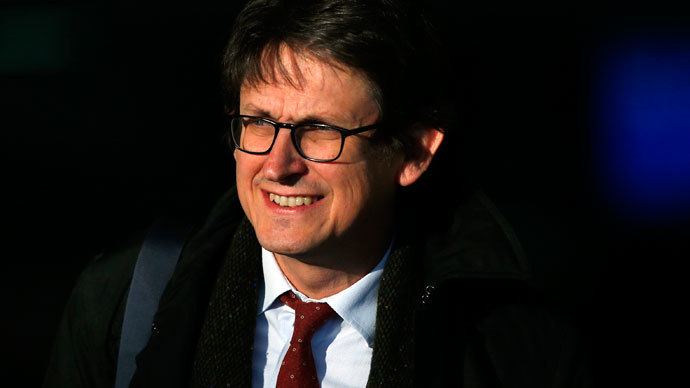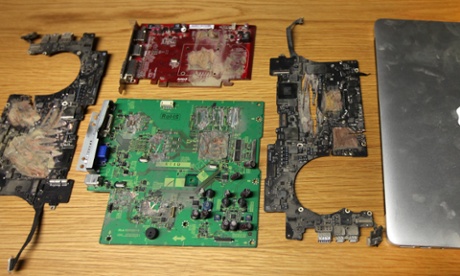- The Guardian, Tuesday 20 August 2013 13.23 EDT
Guardian editors on Tuesday revealed why and how the newspaper destroyed computer hard drives containing copies of some of the secret files leaked by Edward Snowden.
The decision was taken after a threat of legal action by the government that could have stopped reporting on the extent of American and British government surveillance revealed by the documents.
It resulted in one of the stranger episodes in the history of digital-age journalism. On Saturday 20 July, in a deserted basement of the Guardian's King's Cross offices, a senior editor and a Guardian computer expert used angle grinders and other tools to pulverise the hard drives and memory chips on which the encrypted files had been stored.
As they worked they were watched by technicians from Government Communications Headquarters (GCHQ) who took notes and photographs, but who left empty-handed.
The editor of the Guardian, Alan Rusbridger, had earlier informed government officials that other copies of the files existed outside the country and that the Guardian was neither the sole recipient nor steward of the files leaked by Snowden, a former National Security Agency (NSA) contractor. But the government insisted that the material be either destroyed or surrendered.
Twelve days after the destruction of the files the Guardian reported on US funding of GCHQ eavesdropping operations and published a portrait of working life in the British agency's huge "doughnut" building in Cheltenham. Guardian US, based and edited in New York, has also continued to report on evidence of NSA co-operation with US telecommunications corporations to maximise the collection of data on internet and phone users around the world.
The British government has attempted to step up its pressure on journalists, with the detention in Heathrow on Sunday of David Miranda, the partner of Glenn Greenwald, who has led the Guardian's US reporting on the files.
Miranda was detained for nine hours under a section of legislation enacted in 2000 aimed at terrorists. The use of this measure – which applies only to airports and ports – meant the normal protection for suspects in the UK, including journalists, did not apply.
The initial UK attempts to stop reporting on the files came two weeks after the publication of the first story based on Snowden's leaks, about a secret US court order obliging the communications corporation Verizon to hand over data on its customers' phone usage. This was followed by a story detailing how GCHQ was making use of data collected by the NSA's internet monitoring programme, Prism.
Days later the paper published another story revealing how UK intelligence spied on British allies at two London summits.
Shortly afterwards two senior British officials arrived at the Guardian's offices to see Rusbridger and his deputy, Paul Johnson. They were cordial but made it clear they came on high authority to demand the immediate surrender of all the Snowden files in the Guardian's possession.
They argued that the material was stolen and that a newspaper had no business holding on to it. The Official Secrets Act was mentioned but not threatened. At this stage officials emphasised they preferred a low-key route rather than go to court.
The Guardian editors argued that there was a substantial public interest in the hitherto unknown scale of government surveillance and the collaboration with technology and telecoms companies, particularly given the apparent weakness of parliamentary and judicial oversight.
There was no written threat of any legal moves.
After three weeks which saw the publication of several more articles on both sides of the Atlantic about GCHQ and NSA internet and phone surveillance, British government officials got back in touch and took a sterner approach.
"You've had your fun. Now we want the stuff back," one of them said.
Read More and Watch Video Here
*******************************************************
Published on Aug 20, 2013
The
British government has given the Guardian newspaper an ultimatum:
delete all data on Edward Snowden's leaks or risk getting shut down. A
few months ago, Guardian reporter Glenn Greenwald revealed the NSA's
massive surveillance program through the media outlet and now many see
the government's move as retaliation for the leaks. Alan Rusbridger,
editor for the Guardian, justified why they chose to comply with the
government's request, and Josh Levy, Internet campaign director for Free
Press, joins us with his take on the British government's request.*******************************************************
Guardian editor on Miranda detention: ‘Terror and journalism being aligned’
Published time: August 21, 2013 03:02
Edited time: August 21, 2013 08:54
Edited time: August 21, 2013 08:54

The UK government created a “lawless bit of Britain” under the terror act which suspends all checks and balances, Guardian editor Alan Rusbridger said in an interview, adding that the paper is financing David Miranda's lawsuit against the Home Office.
Rusbridger called ports and airport transit lounges a “stateless bit of Britain,” where a government can use the word “terror” to “suspend all the normal rules.”
<i>&lt;i&gt;&lt;br&gt;&lt;/i&gt;</i>
The comment was made in reference to UK authorities detaining and questioning David Miranda, the partner of Guardian journalist Glenn Greenwald, for nine hours in London’s Heathrow airport on Sunday under Schedule 7 of the UK’s anti-terrorism law.
Miranda told the BBC in an interview that he felt threatened during his 9-hour detention and as if “he were naked in front of a crowd.”
Greewald’s partner said that he was “forced to give passwords” to email and social media accounts to his interrogators. Authorities allegedly threatened him with prison if he did not comply.
Inside Britain, journalists and anyone else carrying material have more opportunities to stand their ground. “You can go before a judge, you can argue about public interest and the public interest of that work,” Rusbridger said.

Rusbridger believes there are “confusions in law” when it comes to where you are when you’re in a transit lounge and “whose laws you apply to.”
The UK created this “lawless bit of Britain” over a decade ago, according to the editor. It is a place “where anybody can be questioned for up to nine hours without access to a solicitor and where all your belongings can be confiscated and there’s nothing you can do about it,” he said.
Financing Miranda’s lawsuit
Rusbridger revealed that the Guardian is funding Miranda’s legal actions as he seeks a judicial review of the legal basis for his detention and assurances that the property seized from him by police will not be examined.“The Guardian is supporting that action and we are supporting that in terms of financing it, because David Miranda was acting on behalf of Glenn Greenwald at the time that he was detained. I think it’s a good thing to challenge that law and see exactly why terror and journalism are being aligned in this disturbing way.”

“Miranda wasn’t really on assignment, he is Glenn Greenwald’s partner and Glenn Greenwald is a very busy man and he assists Glenn in his journalistic work. And he was acting as a messenger or intermediary in a way that is difficult for Glenn at the moment because he’s got a lot of work to be doing in Brazil and I think he’s also a bit nervous about traveling at the moment.”
Published on Aug 20, 2013
The
British government's attempts to stem the tide of articles on mass
surveillance have gone beyond intimidating the journalist behind the
publications. Just a day after Glenn Greenwald's partner was detained at
Heathrow airport, The Guardian's editor, Alan Rusbridger, came forward
describing how the authorities pressured the newspaper to destroy
documents provided by NSA leaker Edward Snowden. Mr. Rusbridger has
explained why he gave in to pressure from government agents, and
destroyed hard-drives carrying information obtained from Edward Snowden.RT LIVE http://rt.com/on-air
*******************************************************











No comments:
Post a Comment
Hello and thank you for visiting my blog. Please share your thoughts and leave a comment :)